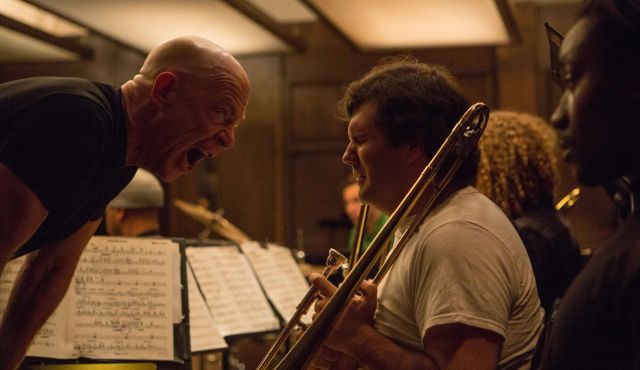I entered the preview screening of Whiplash with the news of the Oscar nominees fresh in my mind. I’d heard very good things about the film, but surely it couldn’t match the sincerity of Boyhood; or the sublimity of Birdman; or the grace of The Theory Of Everything. If, like I did, you doubt the ability of any movie to match or exceed these three, then I am glad to inform you that you are sorely mistaken.
A directorial debut from 29-year-old Damien Chazelle, Whiplash follows young aspiring jazz drummer Andrew Neeman (Miles Teller) as he aims to become, in his words, “one of the greats”. Attending a prestigious music academy, he is taken under the wing of manic teacher and conductor Terence Fletcher (J.K. Simmons). Fletcher is a ruthless figure, aggressively pushing his band beyond their limits on a quest for musical perfection. Although the idea of hurling chairs, snare drums, and complex profanities may seem to many to be too extreme, it appears that the motivation of fear is the technique Fletcher is aiming for. Simmons’ Golden Globe-winning performance is one of the centrepieces of the film, as he strikes a unique balance between Malcolm Tucker (albeit less creative with his insults), and a hair-dryer equipped Sir Alex Ferguson.
The character of Fletcher is constantly a subject of conflict for Neeman, representing the perfection and discipline required in order to reach his goal of becoming a world famous musician. Neeman finds himself in a constant battle with Fletcher and his technique, while we realise that it is Fletcher’s teaching technique that constantly pushes Neeman to improve, whether he knows it or not. Neeman’s life becomes this struggle with knowing he must follow the hard path to improve, but naturally he fights against the ludicrous demands of this. Fletcher is an ever-changing symbol of Neeman’s psychological state, be that guilty, demanding, troubled, or vengeful.
Teller’s performance as Neeman is measured and pragmatic, depicting realistically the constantly shifting mentality of the character, as his ambition develops into obsession, which develops into arrogance and self-righteousness. His relationships with others become strained as his obsession with perfection takes over his life – he literally puts his blood, sweat and tears into his art. It is therefore very apt that he is a drummer, tackling that most physically demanding of musical instruments. The intense physical pressure we see on the outside reflects the internal vicious obsession with wanting to be the best, as well as the strain on his personal life: Neeman admits to having no friends as he “doesn’t see the point”, and breaks up with his girlfriend in order to pursue his dreams.
Visually, the sheer intensity of some of the drumming sequences is near-overwhelming, yet in the best possible way. You feel yourself trying to keep the beat in your own mind, trying to help Andrew on his path to perfection. The tension as we anticipate those dreaded mistakes is key to the drama. The music scenes, although lengthy at points, manage to maintain the interest of the viewer, as there is always a tension between characters, to which the musical piece becomes a soundtrack.
Whiplash is a stunning study of dedication to perfection, and the sacrifices that must be made in order to achieve this. Ambition is ambiguously represented: is it a destructive personal force, or does it push one on to greatness? Or, perhaps, those that achieve greatness must pay this personal price – a sacrifice of their personal life that we so often see comes with fame and fortune.
I have no doubts that Whiplash will be unjustly overlooked for Best Picture at the Oscars. However, my opinion will remain firm: not only is Whiplash absolutely the best film of the past year, but it is also one of the finest films of the decade so far.
Whiplash is now in UK cinemas nationwide.

